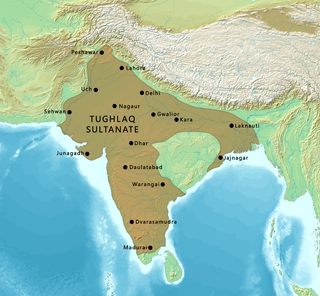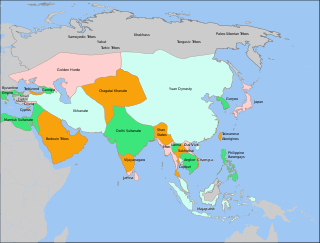
The history of Islam concerns the political, social, economic, military, and cultural developments of the Islamic civilization. Most historians believe that Islam originated with Muhammad's mission in Mecca and Medina at the start of the 7th century CE, although Muslims regard this time as a return to the original faith passed down by the Abrahamic prophets, such as Adam, Noah, Abraham, Moses, David, Solomon, and Jesus, with the submission to the will of God.

The Delhi Sultanate or the Sultanate of Delhi was a late medieval empire primarily based in Delhi that stretched over large parts of the Indian subcontinent, for more than three centuries. The sultanate was established around c. 1206–1211 in the former Ghurid territories in India. The sultanate's history is generally divided into five periods: Mamluk (1206–1290), Khalji (1290–1320), Tughlaq (1320–1414), Sayyid (1414–1451), and Lodi (1451–1526). It covered large swaths of territory in modern-day India, Pakistan, Bangladesh, as well as some parts of southern Nepal.

Hulegu Khan, also known as Hülegü or Hulagu, was a Mongol ruler who conquered much of Western Asia. Son of Tolui and the Keraite princess Sorghaghtani Beki, he was a grandson of Genghis Khan and brother of Ariq Böke, Möngke Khan, and Kublai Khan.

The Ilkhanate or Il-khanate was a Mongol khanate founded in the southwestern territories of the Mongol Empire. It was ruled by the Il-Khans or Ilkhanids, and known to the Mongols as Hülegü Ulus. The Ilkhanid realm was officially known as the Land of Iran or simply Iran. It was established after Hülegü, the son of Tolui and grandson of Genghis Khan, inherited the West Asian and Central Asian part of the Mongol Empire after his brother Möngke Khan died in 1259.
Rashīd al-Dīn Ṭabīb was a statesman, historian, and physician in Ilkhanate Iran.

The Sultanate of Rûm was a culturally Turco-Persian Sunni Muslim state, established over conquered Byzantine territories and peoples (Rûm) of Anatolia by the Seljuk Turks following their entry into Anatolia after the Battle of Manzikert (1071). The name Rûm was a synonym for the medieval Eastern Roman Empire and its peoples, as it remains in modern Turkish. The name is derived from the Aramaic (romī) and Parthian (frwm) names for ancient Rome, via the Greek Ῥωμαῖοι (Romaioi).

The Timurid Empire was a late medieval, culturally Persianate Turco-Mongol empire that dominated Greater Iran in the early 15th century, comprising modern-day Iran, Iraq, Afghanistan, much of Central Asia, the South Caucasus, and parts of contemporary Pakistan, North India and Turkey. The empire was culturally hybrid, combining Turko-Mongolian and Persianate influences, with the last members of the dynasty being "regarded as ideal Perso-Islamic rulers".

The Qara Qoyunlu or Kara Koyunlu, also known as the Black Sheep Turkomans, were a culturally Persianate, Muslim Turkoman monarchy that ruled over the territory comprising present-day Azerbaijan, Armenia, northwestern Iran, eastern Turkey, and northeastern Iraq from about 1374 to 1468.
William of Rubruck or Guillaume de Rubrouck was a Flemish Franciscan missionary and explorer.

The Tughlaq dynasty was the third dynasty to rule over the Delhi Sultanate in medieval India. Its reign started in 1320 in Delhi when Ghazi Malik assumed the throne under the title of Ghiyath al-Din Tughluq and ended in 1413.

The Turco-Mongol or Turko-Mongol tradition was an ethnocultural synthesis that arose in Asia during the 14th century among the ruling elites of the Golden Horde and the Chagatai Khanate. The ruling Mongol elites of these khanates eventually assimilated into the Turkic populations that they conquered and ruled over, thus becoming known as Turco-Mongols. These elites gradually adopted Islam, as well as Turkic languages, while retaining Mongol political and legal institutions.

The Jalayirid Sultanate was a dynasty of Jalayir origin, which ruled over modern-day Iraq and western Iran after the breakup of the Ilkhanate in the 1330s. It lasted about fifty years, until disrupted by Timur's conquests and the revolts of the Qara Qoyunlu Turkoman. After Timur's death in 1405, there was a brief attempt to re-establish the sultanate in southern Iraq and Khuzistan. The Jalayirids were finally eliminated by the Qara Qoyunlu in 1432.
The composite Turko-Persian, Turco-Persian, or Turco-Iranian is the distinctive culture that arose in the 9th and 10th centuries AD in Khorasan and Transoxiana. According to the modern historian Robert L. Canfield, the Turco-Persian tradition was Persianate in that it was centered on a lettered tradition of Iranian origin; it was Turkic in so far as it was for many generations patronized by rulers of Turkic ancestry; and it was "Islamicate" in that Islamic notions of virtue, permance, and excellence infused discourse about public issues as well as the religious affairs of the Muslims, who were the presiding elite."

Several attempts at a Franco-Mongol alliance against the Islamic caliphates, their common enemy, were made by various leaders among the Frankish Crusaders and the Mongol Empire in the 13th century. Such an alliance might have seemed an obvious choice: the Mongols were already sympathetic to Christianity, given the presence of many influential Nestorian Christians in the Mongol court. The Franks—Western Europeans, and those in the Levantine Crusader states—were open to the idea of support from the East, in part owing to the long-running legend of the mythical Prester John, an Eastern king in an Eastern kingdom who many believed would one day come to the assistance of the Crusaders in the Holy Land. The Franks and Mongols also shared a common enemy in the Muslims. However, despite many messages, gifts, and emissaries over the course of several decades, the often-proposed alliance never came to fruition.

Jerusalem in the Middle Ages was a major Byzantine metropolis from the 4th century CE before the advent on the early Islamic period in the 7th century saw it become the regional capital of Jund Filastin under successive caliphates. In the later Islamic period it went on to experience a period of more contested ownership, war and decline. Muslim rule was interrupted for a period of about 200 years by the Crusades and the establishment of the Christian Kingdom of Jerusalem. At the tail end of the Medieval period, the city was ceded to the Ottomans in 1517, who maintained control of it until the British took it in 1917.

A Byzantine-Mongol Alliance occurred during the end of the 13th and the beginning of the 14th century between the Byzantine Empire and the Mongol Empire. Byzantium attempted to maintain friendly relations with both the Golden Horde and the Ilkhanate realms, and was caught in the middle of growing conflict between the two. The alliance involved numerous exchanges of presents, military collaboration and marital links, but dissolved in the middle of the 14th century.
Dei patris immensa was a letter written by Pope Innocent IV to the Mongols. It was written on March 5, 1245, was an exposition of the Christian faith, and urged Mongols to accept baptism. It was intended to be carried by the Franciscan friar and papal envoy Laurentius of Portugal. However, nothing more is known about Laurentius' embassy, and it is possible that he never actually left.
This is a list of kings of Iran of the medieval Islamic period, AD 820 to 1432, arranged genealogically.
The Crusade of the Infants of Aragon was a minor crusade that took place in late 1269. It had its genesis in the same events that led to the Eighth Crusade of the following year. The intention of King James I of Aragon was to join forces with the Mongol Ilkhanate and jointly attack the Mamluk Sultanate. In the event, James himself abandoned the enterprise after a storm forced his fleet into port in September. Two of his illegitimate sons, the infantes Fernando Sánchez de Castro and Pedro Fernández de Híjar, led what remained of the fleet to Acre, but the rendezvous with the Mongols was abandoned and their small force accomplished little before they returned home in the spring of 1270.
This list of works on the history of the Crusades and their mainly Muslim opponents, provides a select bibliography of modern works that are frequently cited in books, papers and articles that discuss these "holy wars". Thousands of histories on these topics have been published between the 11th and 21st centuries; this page only lists modern works on the topic. Works included are referenced in the notes or bibliographies of scholarly secondary sources or journals. Included works are: published by an independent academic or notable non-governmental publisher; authored by an independent and notable subject matter expert; or have significant independent scholarly journal reviews.













